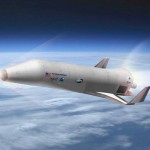
The Defense Advanced Research Projects Agency and its industry partners will transition into the second phase of a program to build a reusable unmanned spaceplane that can carry satellites into space.
DARPA said Thursday it will hold a proposers day April 29 in Arlington, Virginia for phase two of Experimental Spaceplane-1, a program to develop a spaceplane that can carry payloads of at least 3,000 pounds demonstrate aircraft-like flight for 10 times during 10-day periods.
Three contract teams led by Boeing, Northrop Grumman and Masten Space Systems received $19.5 million in combined funds in August 2015 for XS-1’s first phase.
DARPA will award contracts for phases two and three through a competitive process and as Other Transaction Authority agreements to share costs.
“During Phase 1 of the XS-1 program, the space industry has evolved rapidly and we intend to take advantage of multiple impressive technological and commercial advances,†said Jess Sponable, DARPA program manager.
Sponable added the next phase seeks to build on developments from phase one in an effort to optimize costs and time spent by the Defense Department on space system launch missions and satellite architectures.
DARPA added the program has a target cost of approximately $5 million per flight for the operational system, which would include reusable booster and expendable upper stage to help deploy a satellite into low-Earth orbit.




